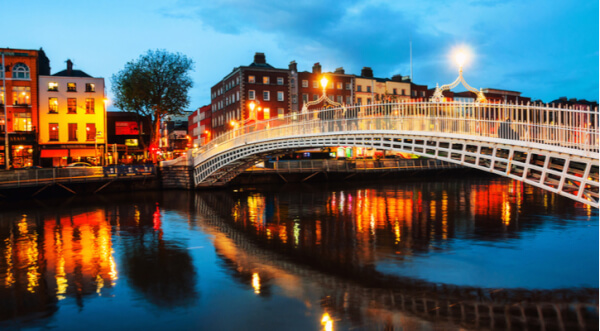Moving to Ireland from Australia
Looking to move to Ireland from Australia? We'll fill you in on the travel and visa requirements, healthcare, cost of living, pros, cons and much more.

The Republic of Ireland is a wonderful place to live, but not always especially cheap. It’s even earned the nickname ‘the Rip-off Republic’ in the past. So instead of getting yourself in an (Irish) stew over your finances, take a look through these tips on how to stay savings-conscious at the start of your time in Ireland.

When you’re looking around for your new home in Ireland, don’t forget that getting somewhere with a garden - or at least plenty of sunlight - might be worth paying extra for in the medium to long term. The ‘grow-it-yourself’ movement in Ireland is, ahem, growing.
Whether you can only manage a pot of parsley on your windowsill, or if you feel sufficiently Irish to plant your own potatoes, there’s a lot to be said for growing your own produce. It’s not just economical - it’s healthy too. Plus it might be a great way to make friends in a new country: you can get all the neighbours around to marvel at your purple sprouting.

Do you really need to get a professional to pack up all your boxes? The thing is, before you let them, you’re going to need to go through everything anyway, to make sure you don’t end up travelling across the ocean with boxes full of T-shirts that don’t fit and old magazines you’re never going to read again. Like it or not, moving countries means going through all your stuff and having a clearout. Why not box everything up yourself while you’re at it?

It depends where you’re coming from, but if you’re making the trip from elsewhere in Europe - especially from Britain - then you shouldn’t get a plane ticket until you’ve discounted your other options. First, it could be cheaper. Second, it’s better for the environment. And third, from atop your ferry you can wave goodbye not just to your loved ones, but also to baggage restrictions.
While planes are understandably strict about how much stuff you can take on board, ferries are much less so, which means you could save a lot in moving costs. Of course it helps if you have a car for this, but there are also plenty of ways to make the ferry trip by train and coach. You can still take more than you can on a plane.
Some people would say that the ferry is more romantic, too. Perhaps it depends on the weather.

To be honest, by the time you’ve swum across the Irish channel and jogged back to your current local gym, half an hour on the cross trainer is going to seem pretty redundant. In the long run it’s probably a better option just to cancel your membership and find a gym closer to your new home.
Now is also the perfect time to review all your magazine subscriptions, credit cards, and of course your household bills. Make sure you have a clear plan of action well before you leave, so you’re not stuck with a bunch of bills that aren’t yours to pay anymore.

Irish banks generally require you to be there in person when you open an account, so you'll probably have to wait till you’ve already moved, before you set up your finances anew. That means there will be that awkward little period at the start of your time in Ireland when you’re living there, but not yet using a local bank account. One of the challenges of moving is working out how to survive like this, without loading up all your suitcases with euros.
A borderless multi-currency account with Wise takes away this stress at a stroke. It lets you store your money in euros, and 27 other currencies too, whether or not you have a local Irish account. As it comes with its own local account details including an IBAN, you can easily make transfers into or out of your borderless account, at any time - in euros, pounds, Australian dollars or US dollars. You can also convert between the supported currencies at the mid-market rate. It’s a simple way to avoid the frustration and expense of making costly international payments every time you need to transfer money. Consumer debit cards are also coming in early 2018 which will make it even easier for you to start your trip.

Getting health insurance in Ireland can be a complex business and it really pays to know what you’re eligible for. The government provides means-tested Medical Cards, so if you earn less than a certain amount per month then you can get one of these and receive most standard medical services for free. There’s not really a downside to this so if you’re eligible, you should get one.
And whatever you do, don’t forget to sign up to the Drugs Payment Scheme. Everyone is eligible for this scheme, which caps your monthly spend on prescription drugs at €144. Hopefully you’ll never need to spend that much at the pharmacy, but if you ever do, you can get bailed out for free - so long as you’ve signed up.

The days of sticking a coin in the electric meter may be behind us, but a new trend in Ireland is appealing to people tired of soaring prices and unpredictable bills. Pre-paid (or pay-as-you-go) electricity is catching on, and can seem like an appealing prospect in that you never end up paying too much.
‘Too much’ is a relative term, though. Pre-paid rates tend to compare unfavourably to standard rates, and there may be extra costs such as maintenance fees: in terms of value for money, it’s a worse deal than a standard tariff. Pre-paid is only good value if you’re 100% certain that paying for your electricity in this manner will cause you to cut back on how much you use. Your cheapest option will always be shopping around for the best rate, which probably won’t be pre-paid, and then just turning all the lights off when you go out.

Renting property in Ireland is notoriously laid back, so if you’re used to the high-stress, bureaucracy-heavy rentals typical of London or New York, you might be in for a shock. Notice periods are generally just one month, which means that places come and go swiftly. So if you’re still a few months away from moving, you might have to simply sit tight, or else find a different way to begin your trip, like staying in a holiday home or with a friend. Once you’ve found a place, don’t be surprised if you’re not even asked to sign a contract. A positive of this relaxed approach is increased negotiating power for the tenant - have a chat with your landlord and you might be able to compromise on the rental price, particularly if you want to stay for a while.
Most property is let furnished, and you might be in for a pleasant surprise: the amount of furnishing included is typically very high, so you won’t be stuck with nothing but a tatty sofa and half a set of curtains. The place might well be equipped even down to the cutlery drawer. Check first, but if you’re planning to get a furnished place, you might want to find your spoons a new home before you move.

There should be no need for you to bid farewell to your beloved Mr Snuffles before you go to Ireland, but do make sure you’ve ticked all the boxes. The Irish agriculture website has full information on the restrictions for bringing pets to Ireland, which vary depending on the animal, and also depending on where it’s coming from.
And do remember: a pet passport isn’t like one of those driving licenses they hand out at Legoland. It’s a real document that you’ll need when you move between countries with your furry companion. Now might also be the perfect time to take out pet insurance, just in case. Once it’s all sorted, your companion will be in good company: over half the population of Ireland has a pet.
Good luck for your move to Ireland. Try to keep the costs down, but don’t forget to enjoy yourself in your new home as well. Go n-éirí an bóthar leat, as they say in Gaelic: may your journey be successful.
*Please see terms of use and product availability for your region or visit Wise fees and pricing for the most up to date pricing and fee information.
This publication is provided for general information purposes and does not constitute legal, tax or other professional advice from Wise Payments Limited or its subsidiaries and its affiliates, and it is not intended as a substitute for obtaining advice from a financial advisor or any other professional.
We make no representations, warranties or guarantees, whether expressed or implied, that the content in the publication is accurate, complete or up to date.

Looking to move to Ireland from Australia? We'll fill you in on the travel and visa requirements, healthcare, cost of living, pros, cons and much more.

Child maintenance in Ireland is complicated — read on to learn what you need to know.

Having a baby is a priceless experience, but if you’re a foreigner in a different country, it can be daunting to navigate new healthcare systems and impending...

Ireland is known for its love of food and drink, picturesque countryside and bustling cities. Read on to find out the pros and cons of living in Ireland.

Roaming around Ireland is the fantasy of many, driving through the beautiful green countryside and stopping for a pint in any of the country’s quaint small...

If you’re an expat living in the Republic of Ireland, you might be considering taking up an Irish citizenship. There are some clear benefits to this. Becoming...